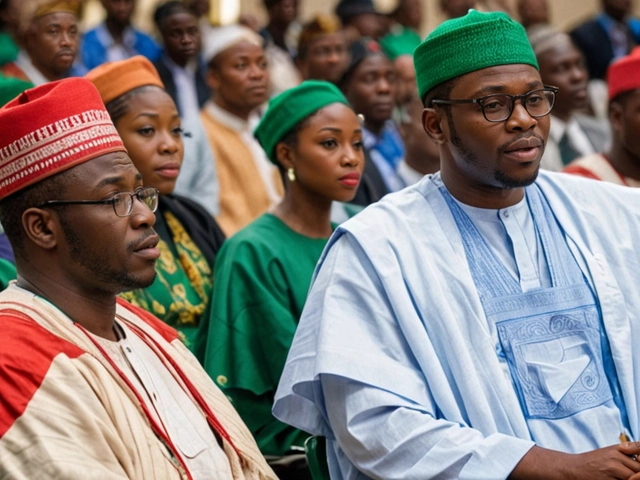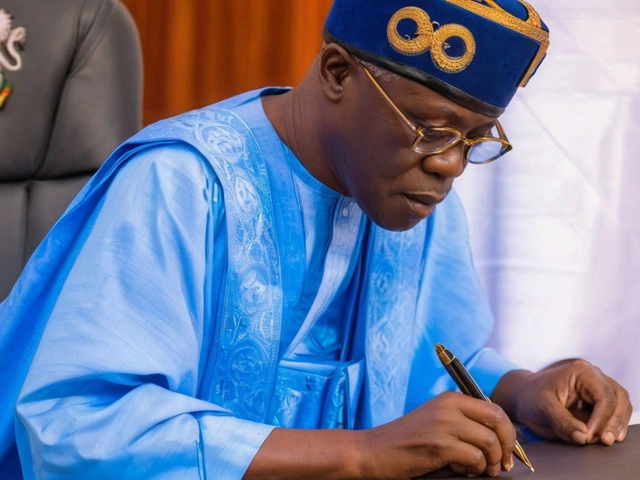When Chief Uche Nnaji, Minister of Innovation, Science and Technology of Federal Ministry of Innovation, Science and Technology hosted two back‑to‑back diplomatic meetings in Abuja on June 5‑6, 2025, Nigeria announced fresh joint platforms with Brazil and Cuba aimed at accelerating biotech, renewable energy and space projects. The talks, framed as a concrete push for South‑South cooperation, resulted in proposals for a Nigeria–Brazil Joint Innovation and Technology Working Group and a Nigeria–Cuba Innovation and Biotechnology Working Group.
Backdrop: BRICS entry and the push for South‑South partnership
Just months earlier, on , Nigeria secured partner‑country status in the BRICS bloc, joining nine other emerging economies. With a population of about 216 million—the world’s sixth‑largest and Africa’s biggest—Nigeria is positioning itself as a hub for technology transfer across the Global South. The ministry’s roadmap cites three pillars: renewable energy, biotech, and space exploration, all of which map onto the expertise of its new partners.
Brazil partnership: a high‑powered engine for tech collaboration
During the first session, Carlos Garcete, Brazil’s Ambassador to Nigeria, arrived with Deputy Head of Mission Minister Leandro Silva and Trade Attaché Alexandre Manhães. The meeting was formalised as Nigeria–Brazil Joint Innovation and Technology Working GroupAbuja. Nnaji outlined a “high‑powered engine” that would track bilateral projects, align research priorities and fast‑track joint industrial ventures.
Key sectors earmarked include:
- Agricultural technology – precision farming and drought‑resilient crops.
- Green fuel – bio‑ethanol and biodiesel production from local feedstocks.
- Space cooperation – joint satellite missions and data sharing via National Space Research and Development Agency (NASRDA).
Both sides signed a Memorandum of Understanding on space technology, signalling immediate movement from discussion to delivery. Nnaji emphasized, “Our relationship with Brazil is entering a new phase—one focused not just on diplomacy but delivery.”
Cuban biotech collaboration: scaling vaccine and bio‑innovation capacity
The second meeting brought in Miriam Morales Palmero, Cuba’s Ambassador to Nigeria. Known for Cuba’s world‑renowned biotech sector, Palmero discussed a parallel framework: the Nigeria–Cuba Innovation and Biotechnology Working Group.
Agreements will channel Cuban expertise into Nigeria’s vaccine production pipelines, biotech research, and technical education. A second MoU on biotechnology and vaccine production was signed, linking National Biotechnology Development Agency (NABDA) with Cuban research institutes.
“We are open for breakthrough partnerships,” Nnaji told the delegation. “With Brazil and Cuba, we have friends who share our values and ambitions; together, we can build a future of prosperity, powered by innovation.”
Whole‑government readiness: agencies line up to execute
Beyond the ministries, senior directors from key agencies—National Office for Technology Acquisition and Promotion (NOTAP), Raw Materials Research and Development Council (RMRDC)—joined the talks, underscoring a whole‑of‑government approach. The agencies will draft joint work plans, establish funding mechanisms, and monitor progress through quarterly review panels.
Projected investment totals exceed $200 million over the next five years, split across green‑fuel pilots, biotech labs, and two small‑satellite missions scheduled for launch in 2027.
Implications for Nigeria’s innovation ecosystem
Analysts see these partnerships as a catalyst for several outcomes:
- Talent retention – with joint research institutes, Nigerian scientists gain pathways to work on cutting‑edge projects without leaving the country.
- Export potential – bio‑fuel and biotech products could reach markets across Africa and Latin America, diversifying Nigeria’s export basket.
- Strategic autonomy – home‑grown vaccine capacity reduces reliance on external suppliers, a lesson sharpened by the COVID‑19 pandemic.
Dr. Robert Ngwu, Senior Special Adviser (Administration) to the minister, called the move “a significant diplomatic step poised to reshape South‑South cooperation,” and warned that implementation will require rigorous project management.
What’s next: timelines and milestones
Both working groups are slated to convene their inaugural sessions by the end of Q4 2025. Immediate actions include:
- Establishing a joint secretariat in Abuja.
- Launching pilot projects: a bio‑ethanol plant in Kaduna (Brazil) and a recombinant vaccine lab in Lagos (Cuba).
- Signing a trilateral research grant framework, targeting $45 million in co‑funded grants by 2026.
Watch for a follow‑up press release from the ministry in early 2026, which will detail the first tranche of funding and name the appointed project leads.
Frequently Asked Questions
How will the Brazil partnership affect Nigeria’s renewable energy sector?
The joint working group will fund three pilot bio‑fuel facilities that convert agricultural waste into ethanol and biodiesel. By 2027, these plants could supply up to 12 % of Nigeria’s domestic fuel demand, reducing imports and cutting emissions.
What benefits does the Cuban biotech collaboration bring to Nigerian vaccine production?
Cuba’s expertise will accelerate the establishment of a recombinant protein vaccine line in Lagos, targeting malaria and Lassa fever. The partnership aims to produce at least 10 million doses annually, narrowing the supply gap highlighted during recent health crises.
Which Nigerian agencies are responsible for overseeing the joint projects?
Key oversight will come from the Federal Ministry of Innovation, Science and Technology, NASRDA for space‑related work, NABDA for biotech, NOTAP for technology acquisition, and RMRDC for raw material research. A dedicated secretariat will coordinate day‑to‑day activities.
When can we expect the first joint satellite mission with Brazil?
The inaugural Nigeria–Brazil small‑satellite mission is slated for launch in early 2027, following a year of joint design and testing. It will focus on climate monitoring and agricultural data collection.
What does this mean for Nigeria’s role in the BRICS partnership?
The collaborations illustrate Nigeria’s intent to move from a peripheral partner to an active contributor within BRICS, leveraging shared technology and expertise to drive economic diversification and enhance its geopolitical standing.





Comments
Another PR stunt to distract from Nigeria’s real problems.
Great to see South‑South collaboration gaining real traction.
Nigeria’s partnership with Brazil and Cuba could jump‑start biotech and renewable projects that matter to ordinary people.
The joint working groups give a clear roadmap for future cooperation.
When nations tie their scientific dreams together, it feels like a quiet rebellion against the chaos of geopolitics.
We’re reminded that progress isn’t just a buzzword, it’s a pulse that can be felt in labs and farms alike.
Hope doesn’t live in policy papers; it lives in the tiny cultures we coax to grow in petri dishes and fields.
The Nigeria–Brazil–Cuba framework touches on three pillars that could have a multiplier effect on the economy.
First, the biotech collaboration promises technology transfer that can reduce vaccine import dependence and create local expertise.
Second, the bio‑fuel projects will leverage agricultural waste, lowering energy import bills and creating rural jobs.
Third, the satellite initiative will improve climate data, which is essential for agriculture and disaster mitigation.
Implementation will need robust project management: clear milestones, transparent funding, and regular audits.
Each working group should set up a steering committee with representation from academia, industry, and civil society.
Capacity‑building workshops can ensure Nigerian scientists and engineers are ready to take lead roles.
Public‑private partnerships could attract venture capital for scaling successful pilots.
Regulatory harmonization between the three countries will be key to move from prototypes to marketable products.
Intellectual property agreements must balance rewarding innovation and ensuring affordable access.
The secretariat in Abuja should publish quarterly progress reports to keep stakeholders informed.
Monitoring and evaluation frameworks need predefined KPIs: number of vaccines produced, megawatt‑hours of bio‑fuel generated, and satellite data products delivered.
Collaboration with regional bodies like the African Union can amplify impact across West Africa.
Don’t forget to involve local communities early; their buy‑in can make or break adoption.
In short, the potential is there, but translating agreements into tangible outcomes will require disciplined execution.
These partnerships represent a bold step toward sustainable growth and scientific self‑reliance It is encouraging to see ministries aligning their strategic visions with concrete projects The focus on biotech, renewable energy, and space signals a forward‑looking agenda that can inspire the next generation of innovators
I’m pleased to see such collaborative spirit emerging across continents.
It’s essential that these initiatives stay inclusive, giving space for smaller labs and start‑ups to contribute.
Building capacity at the grassroots level will ensure the benefits reach everyday citizens.
Wow, another shiny announcement that will probably end up in a cabinet drawer 😂👍
At least they’re talking about biotech, but where’s the accountability?
From a strategic perspective, leveraging Brazil’s agritech acumen and Cuba’s vaccine expertise constitutes a synergistic alignment of geopolitical assets.
The operationalization of this trilateral framework must prioritize sovereign technological autonomy while circumventing external dependency loops.
Any deviation towards bureaucratic inertia will undermine the intended nationalistic resurgence.
The formalization of these inter‑governmental agreements marks a significant milestone in fostering cross‑regional scientific cooperation.
I look forward to observing the tangible outcomes in the coming years.
Oh great, another “innovation” pact – because we totally need more bureaucracy to solve vaccine shortages.
Maybe the real innovation is how fast they can write memos.
It is evident that the success of these collaborations will hinge upon meticulous alignment of regulatory frameworks, rigorous adherence to project timelines, and the establishment of a transparent funding mechanism that precludes fiscal misallocation.
This so‑called “South‑South” alliance reads like a screenplay for a grand saga where heroes are promised but rarely deliver.
We have witnessed countless promises crumble under the weight of corruption and incompetence.
Will this time be different, or are we simply rehearsing the same old drama?
Only a steadfast commitment to accountability can rewrite this narrative.